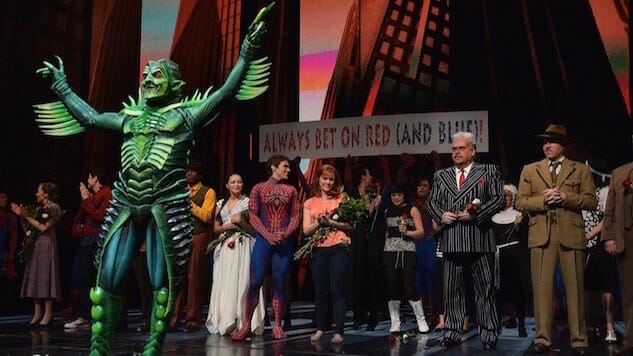23 Broadway Shows That Closed Immediately
Getty Images
At the end of this month, The Phantom of the Opera will celebrate its twenty-ninth consecutive year on Broadway. At over 12,000 performances, it is the longest running Broadway show in history, and since its closest competitor (the current revival of Chicago) clocks in at only 8,387, it is likely to hold the title for many years to come. That’s the funny thing about a hit Broadway show; unlike a blockbuster movie, it can’t really set a record after one great weekend. Sure, the ticket prices for Hamilton may be marked-up to like a thousand dollars at this point, but remember: people were also very excited about Contact, which I just learned was not based on the Jodie Foster movie. The point is, what Broadway investors really care about at the end of the day is staying power, a quality even more intangible and unpredictable on Broadway than in movies or TV. I’ve never seen Phantom, but I assume that it continues to draw the bridge and tunnel crowd because people really love mask work.
On the other side of the coin, even some of Broadway’s most notorious flops ran way longer than you’d think. The infamous Spider-Man: Turn Off the Dark ran for like three years. That means when you dig a little deeper in search of Broadway’s true worst failures, you find a fascinating, depressing graveyard of shows that closed almost immediately after opening. Here are some of our favorites, in order of how long they managed to hang on.
Chess (68)
Let’s start simple. Sixty-eight performances is hardly an overnight closure, I suppose, though it’s less than even a limited engagement. Still, it’s worth remembering that Chess—the concept-album turned musical by the guys from ABBA—was basically reverse-engineered to be the next mega-musical of the British invasion. The score retains its fair share of cult fans, but the musical itself, about U.S.-Soviet tensions played out by a Bobby Fischer-esque chess player and his Russian rival, was an unmitigated disaster on Broadway. Despite a substantial revamp of the book, designed to appeal to a New York audience, Chess could not hold a crowd. Lyricist Tim Rice later commented that Chess “costs too much brainpower for the average person to follow it.” I’m sure that was the problem.
The Civil War (61)
The Civil War is an awfully big conflict to communicate over the course of one musical, and the minds behind The Civil War clearly felt so too. Eschewing plot altogether, The Civil War takes the form of a revue that follows soldiers on both sides of the conflict, as well as the slaves caught in the middle. They were responsible for the pop, rock, and country songs that made up the bulk of the music. If this whole thing sounds like a bit of a mess, it’s because it was. Despite two Tony nominations, The Civil War closed in June of 1999, and hasn’t been seen on Broadway since.
The Rocky Horror Show (45)
It’s strange to think of the stage version of The Rocky Horror Show as a Broadway flop, considering the immortal midnight popularity of its film adaptation. And, at least initially, it wasn’t a flop at all. Having been picked up by eccentric producer Lou Adler a mere thirty-six hours after he saw a performance, Ricky Horror previously had successful runs in L.A., Sydney, and Melbourne. The cast had just filmed The Rocky Horror Picture Show in England and was now headed for a Broadway run in New York. Victory lap, right? Unfortunately, Broadway theatre-goers were too weirded out by this singularly bizarre musical to let it live long. Rocky Horror got the last laugh, however, eventually becoming the longest running theatrical release in film history.
All About Me (20)
God, something in me really wishes All About Me had been a hit. This joint effort by Christopher Durang, Michael Feinstein, Barry Humphries, and Humphries’ drag-alter-ego Dame Edna Everage was a deliberate throwback to comedy-duo revues with a clever twist: Feinstein and Dame Edna were rivals who were being forced to star alongside each other. It was only scheduled for a limited engagement anyway, but closed prematurely. Durang was fine; Vanya and Sonya and Masha and Spike hit Broadway three short years later. The Dame Edna character was retired two years later, in 2012, but has made a few subsequent appearances.
Dude (16)
-

-

-

-

-

-

-

-

-

-

-

-

-

-

-

-

-

-

-

-

-

-

-

-

-

-

-

-

-

-

-

-

-

-

-

-

-

-

-

-








































